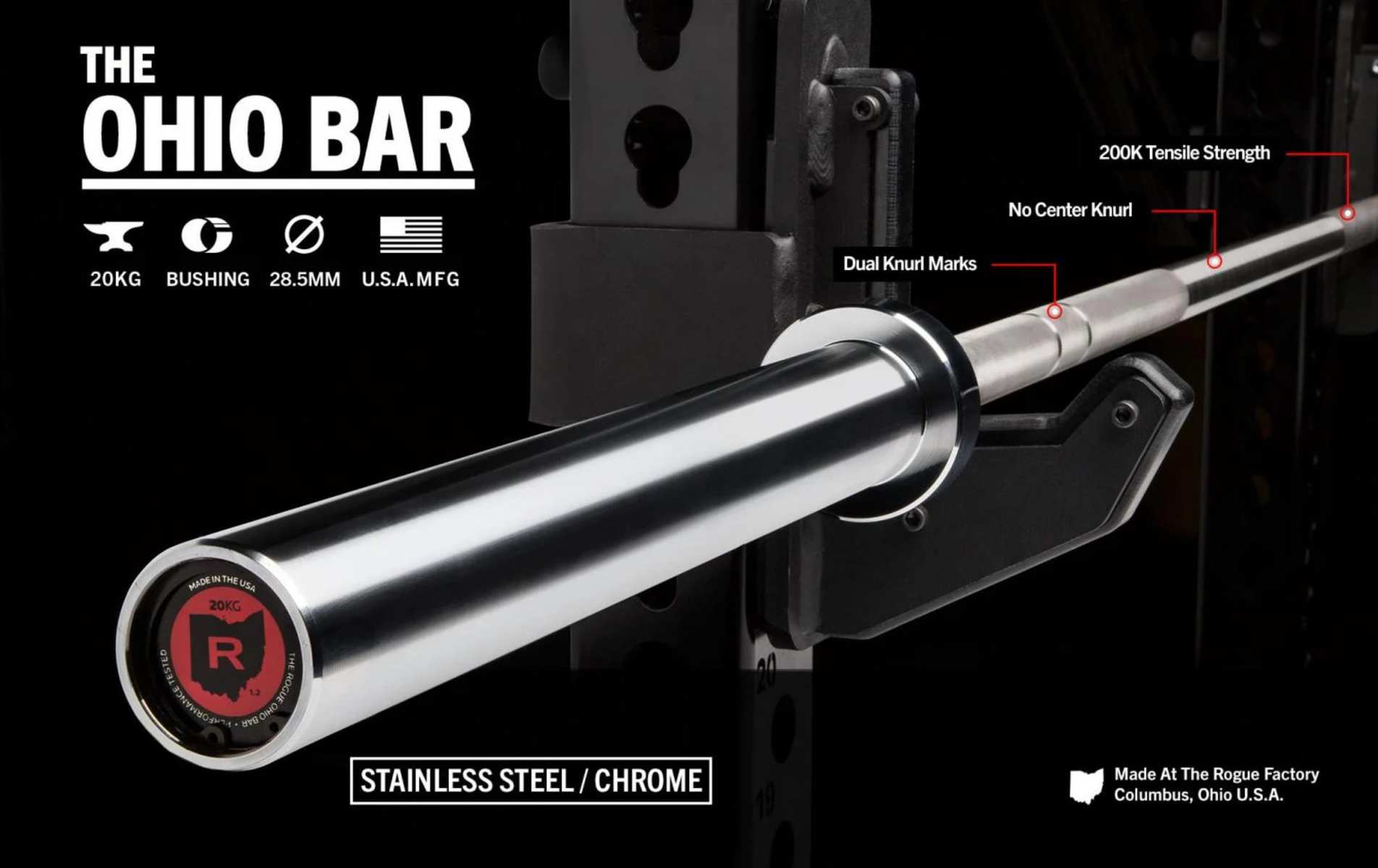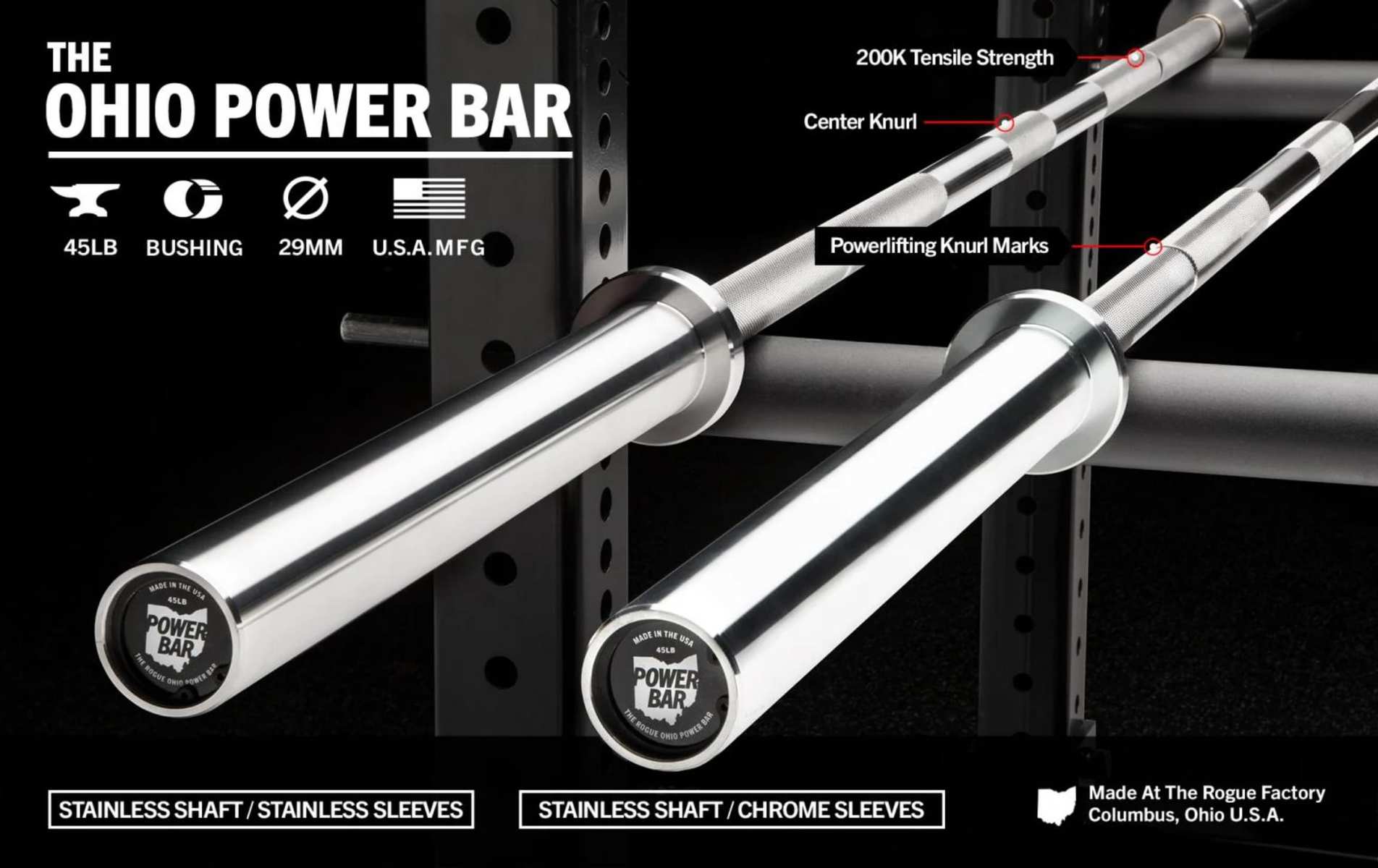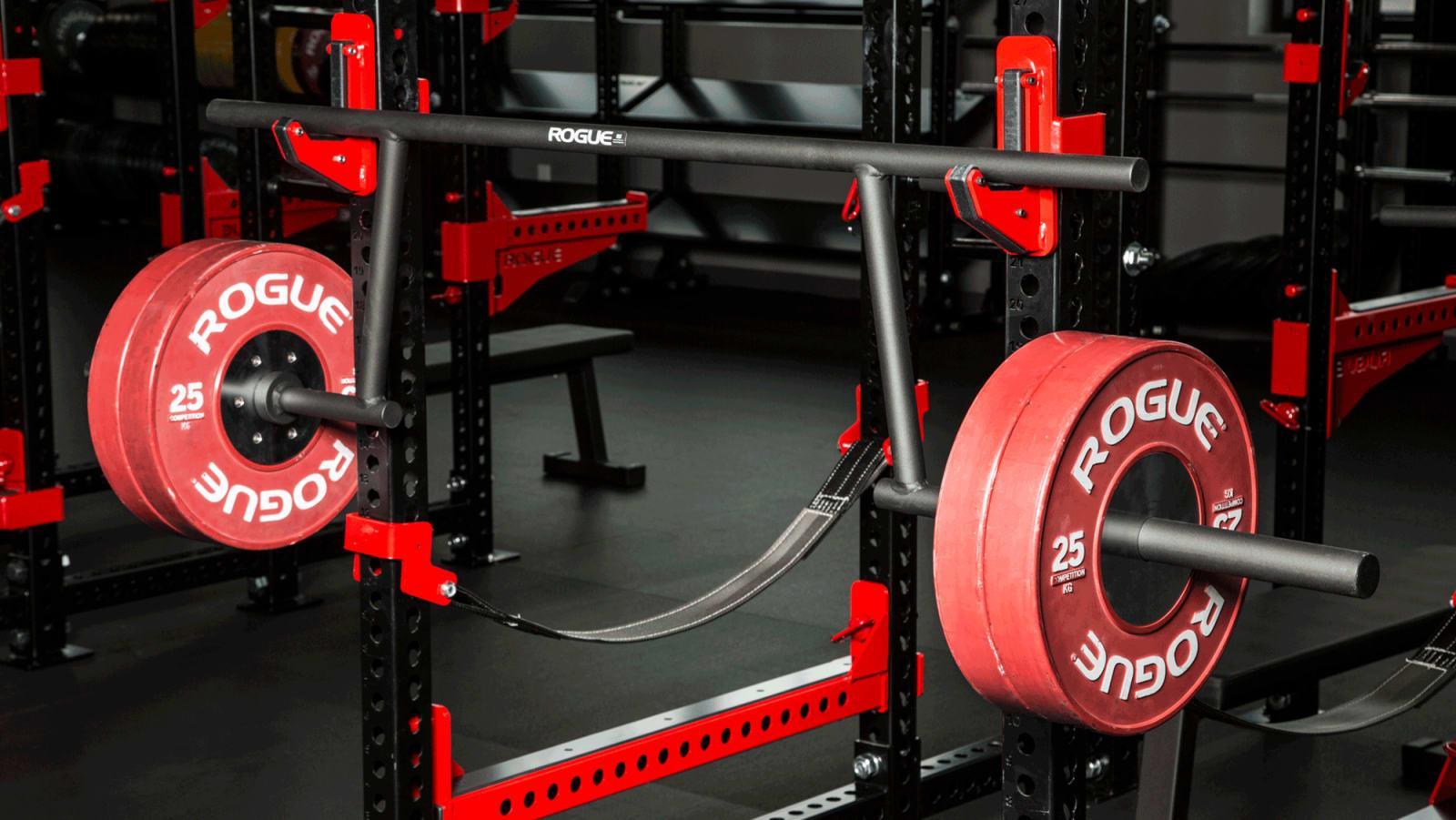Hey guys, Dante here.
In my research on different bench press bars, I’ve discovered there’s more to these bars than meets the eye. Each type has its own set of benefits that can impact your performance and comfort during your training. This guide will help you learn more about each so you can build the strongest bench possible.
Let’s get started!
Key Takeaways
| Type of Bench Bar | Best For/Not Great For Bench Pressing | Best Available Barbell |
|---|---|---|
| Traditional Barbell | All-around training; suitable for bench pressing and various other exercises. | Rogue Ohio Bar |
| Power Bar | Specifically designed for heavy powerlifting movements; best for bench presses with a thicker shaft diameter. | Rogue Ohio Power Bar |
| Swiss/Multi-Purpose/Football Bar | Building strength with shoulder-friendly grips; versatile for bench press and other exercises. | Bells Of Steel Arch Nemesis Bar |
| Cambered Bar | Building a more stable bench press but with less utility than a Swiss bar; not as versatile. | Rogue CB-1 Camber Bar |
| Buffalo Bar | Similar to a power bar but more ergonomic; reduces joint strain, good for heavy bench pressing. | Kabuki Strength Duffalo Bar |
| EZ Curl Bar | Better for biceps and triceps training; not ideal for bench pressing due to limited grip options and less stability. | Rogue Curl Bar |
| Bamboo/Earthquake Bar | Stability training and rehabilitation; not designed for heavy lifting or maximizing bench press weights. | BandBell Bamboo Bar |
Types Of Bench Press Barbells
Different bars for the bench cater to various needs, from boosting strength to protecting your joints. Each type has its own perks for your workouts. If you’re curious about the options beyond the usual, a look at some top specialty barbells could be quite revealing.
Here are the most common best press bars you can expect to find.
Traditional Barbell
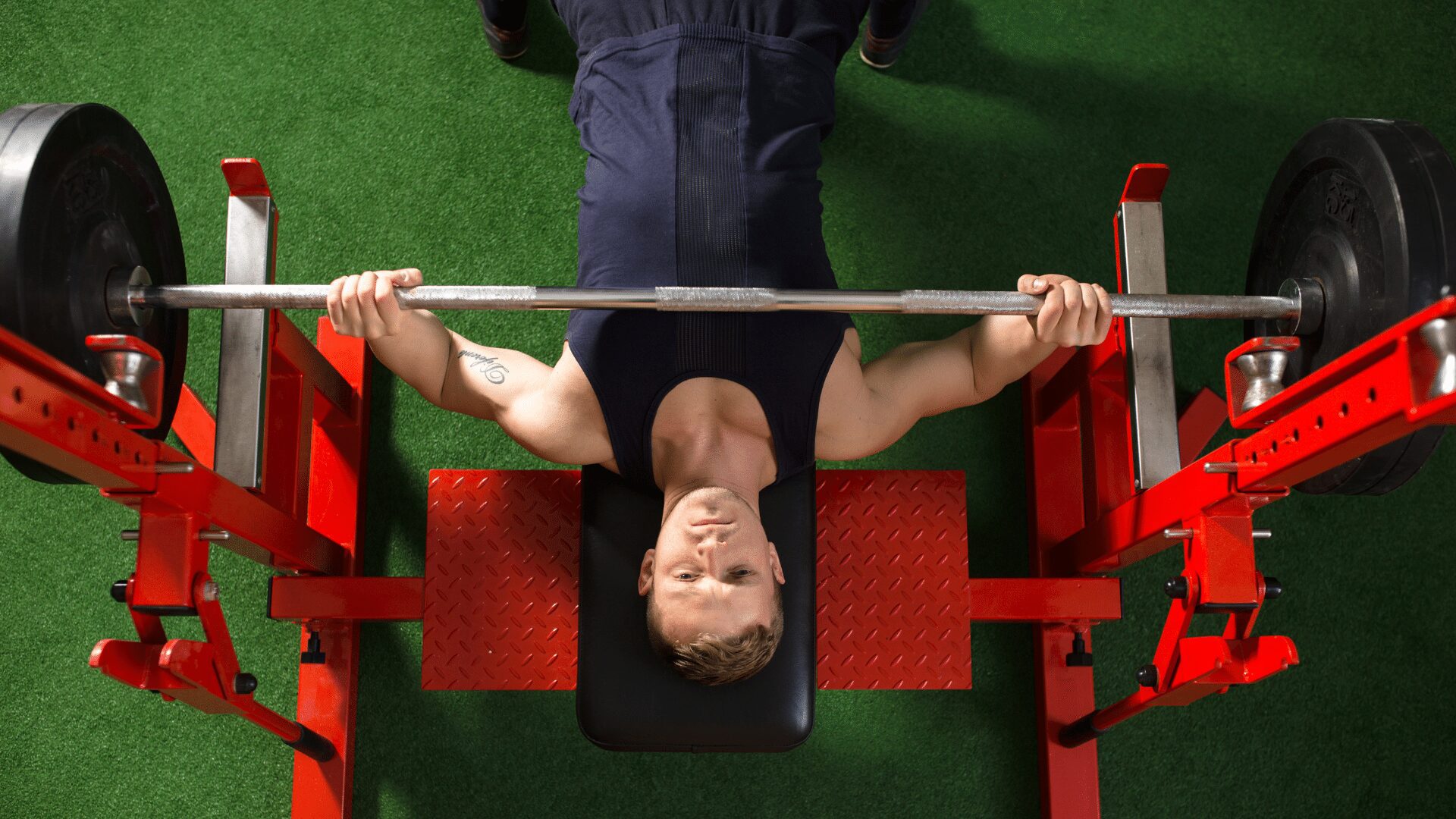
The traditional barbell, or the multi-purpose bar, is a jack-of-all-trades. It’s straight, simple, and gets the job done for almost any exercise, bench pressing included.
It’s the kind of bar you’ll see in just about every gym, known for its standard weight of around 20kg (45 lbs) and length of 2.2 meters (7.2 feet). They’re built tough, too, meant to handle heavy weights and last a long time.
But, it’s not without its downsides. The straight design can be a bit rough on your wrists and shoulders when pressing heavy, more so if you’ve had injuries in the past. It’s also pretty basic which might be a negative for some.
Overall though, it’s incredible for a variety of lifts and perfectly suitable for different variations.
PROS
CONS
Best Traditional Bar – Rogue Ohio Bar
For training the bench, the
The lifetime warranty is definitely reassuring as you know your investment is protected. Plus, the range of coatings, from stainless steel to Cerakote, lets you choose one that fits your style and needs perfectly. And I’m not the only one who thinks so; the feedback online is overwhelmingly positive, highlighting its versatility and solid build.
On the flip side, the price tag is something to consider. It’s pricier than many other bars out there, especially if you opt for the stainless steel version. And while I love the look and feel of it, keeping the black oxide finish in top condition can be a bit of a hassle in humid environments.
However, after weighing the pros and cons, the
Power Bar
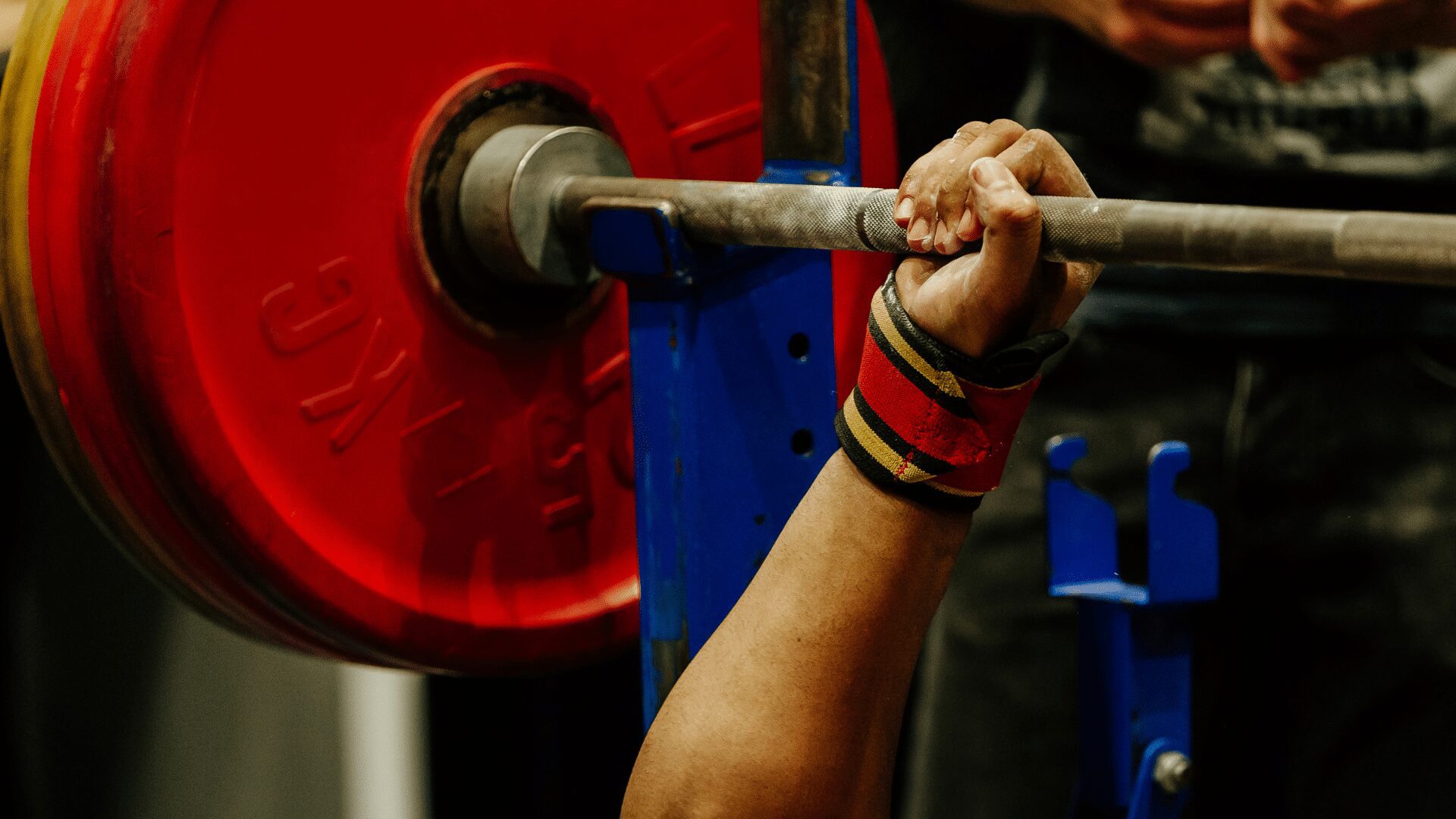
For heavy lifts, especially the bench, nothing beats a power bar for me. Its design, featuring a thicker shaft diameter, makes it incredibly stable and comfortable to hold. This stability is crucial when aiming for maximal power. The thicker grip also means less strain on your hands, allowing you to focus on the lift rather than fighting the bar.
One of the best features of power bars is their stiffness, unparalleled except by squat bars. This characteristic minimizes the bar’s whip or bounce during heavy presses, providing a more predictable and controlled lift. This aspect alone has significantly improved my bench technique and confidence under heavy weights.
For those curious about diving deeper into the specifics of powerlifting equipment, exploring the best powerlifting barbells can provide valuable insights into making the right choice for your training needs.
However, power bars are not without their limitations. Their specialized nature means they’re not as versatile for other types of training. If your workouts include a variety of exercises beyond powerlifting, you might find the power bar too focused for your needs.
For a broader understanding of how power bars fit into the larger spectrum of lifting equipment, checking out a comprehensive guide on the different types of barbells can be incredibly helpful.
PROS
CONS
Best Power Bar – Rogue Ohio Power Bar
The
Starting with the pros, the variety of finishes you get with this bar is impressive. Whether you’re into the sleek look of stainless steel or the rugged appeal of black zinc, there’s something for everyone. Plus, Rogue’s ZEUS system lets you customize your bar, which is pretty cool if you ask me.
The knurling? It’s like it’s made for heavy lifting—aggressive enough to keep your grip secure without tearing up your hands. The fact that it’s IPF certified is the cherry on top, especially for those of us who take our training seriously. And those thinner sleeves on the IPF version make a noticeable difference in the bar’s stiffness, a definite plus for benching.
On the flip side, the stainless steel model does hit the wallet harder. It’s a trade-off for durability and less maintenance, but yeah, it’s a consideration. The grooved sleeves have given me and a few others some grief too, making plate changes a bit of a hassle. And while I’m all for the look of a cerakote finish, it can soften the feel of the knurling, which might not be everyone’s cup of tea.
All in all, despite a few cons, the
Swiss/Multi-Purpose/Football Bar
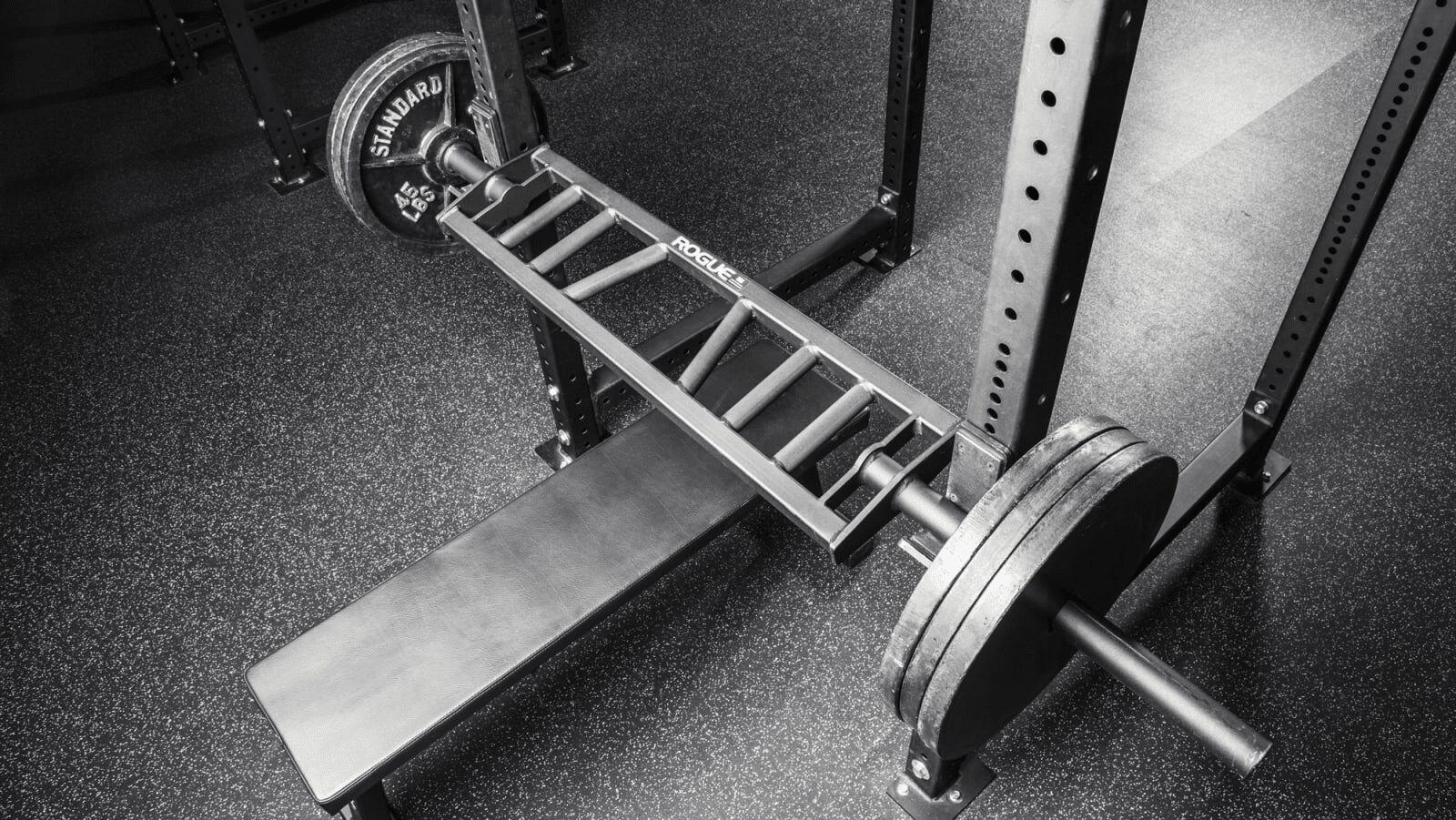
Swiss bars, or as some call them, multi-grip or football bars, are one of the most interesting specialty bars available. The variety of neutral and angled grips they offer makes them incredibly shoulder-friendly, which is a big deal for anybody who’s had to navigate around shoulder issues but still wants to lift heavy weights. Beyond just benching, these bars are great for mixing in overhead presses and rows, ramping up their value.
What stands out to me about the Swiss bar is its adaptability. Whether you’re aiming to train different muscle groups or just want some variety in your training, the grip options on a Swiss bar give you the flexibility to do so. It’s especially useful for anyone needing a more joint-friendly option.
There are some differences between Swiss and football bars which I’ve covered here.
Swiss bars feel different and tend to weigh more than your standard barbell, which adds another layer of challenge and novelty to your lifts.
And if you’re on the hunt for the best multi-grip barbell, I’ve got a guide for that as well.
PROS
CONS
Best Swiss Bar – Bells Of Steel Arch Nemesis Bar
The Bells Of Steel Arch Nemesis has become my go-to Swiss bar for the bench, and here’s why. It’s not just about the price, which, by the way, is pretty hard to beat for the quality you get. This bar is all about versatility—whether you’re doing presses, working out your brachialis with hammer grip curls, or hitting the lat pulldown machine, it’s got you covered.
What really sets it apart for me are the design details. The angles on this bar are just right, making it feel like you’re using dumbbells. Speaking of comfort, the cage width is spot on, avoiding any awkwardness in overhead moves, and the shorter cage length means you can fit it on any rack without a hassle. The arched camber is another plus, giving it a premium feel without the premium price tag. And at 24 lbs, it’s lightweight enough that you shouldn’t feel intimidated when setting up or moving it around.
However, it’s not without its downsides. The angled grips are great, but it doesn’t have any neutral grip options which some users might prefer. Also, the sleeves are a bit on the thin side, so you’ll have to get special collars for them. And while it feels sturdy enough with heavy weights, I can tell it’s not quite as beefy as some of the more expensive models out there. I do think the 600-pound weight capacity is fine for the majority of lifters though so I wouldn’t worry about this too much. Lastly, the knurling and powder coat finish aren’t the best I’ve seen, but they do the job.
The Bells Of Steel Arch Nemesis is a solid choice for anyone looking to add a Swiss bar to their training without breaking the bank. It’s got a few quirks, but the benefits far outweigh the drawbacks for me.
Cambered Bar
The cambered bar seems like a pretty interesting choice for anyone interested in adding an element of instability you don’t get with straight bars. Think of it as making your muscles work a bit harder to keep everything steady, much like what happens with those earthquake or bamboo bars which we’ll cover in a bit. It’s not just shaking things up for the sake of it; this extra effort can actually lead to building a more stable and stronger bench.
Now, it doesn’t have the Swiss bar’s versatility, this bar will mainly be for focusing on specific exercises like squat and bench variations. The swinging motion of the plates demands more from your stabilizing muscles, which, in turn, sharpens your overall lifting form and strength.
But here’s the thing – that instability factor? It’s not everyone’s favorite.
It takes a bit of time to get the hang of, and if you’re not used to it, you might find it a tad intimidating. Plus, cambered bars aren’t as easy to come by as your standard gym barbell, and they can be a bit pricier, too.
If you’re looking to add a challenge to your bench training and are ready for that initial learning curve, the cambered bar could be worth considering.
PROS
CONS
Best Cambered Bar – Rogue CB-1 Camber Bar
The Rogue CB-1 Camber Bar isn’t just solid—it shakes things up, making each press more about engaging the right muscles and less about just moving weight. The cambered design really tests your stability, which most find super helpful for building strength in a way that straight bars just don’t.
The build quality? Spot on. Rogue’s known for durability, and this bar lives up to that reputation. It’s got a powder coating that offers a decent grip, so I’m not worrying about slippage mid-lift.
But, it’s not perfect. The lack of center knurling is a miss for me; you’ll definitely miss that extra grip if you plan on squatting with it too. And the Rogue sticker peeling off is a minor annoyance—it doesn’t affect performance, but I’m sure most of you want your equipment to look good.
All in all, the Rogue CB-1 is solid for the bench. It challenges you in all the right ways and feels like it’ll last forever.
Buffalo Bar
The Buffalo Bar stands out as a prime choice for anyone aiming to build a stronger bench while prioritizing joint health. Its distinctive curve is not just for show; it facilitates a more anatomically friendly grip, potentially increasing the range of motion for the lifter. This isn’t merely a comfort feature; it’s a strategic advantage, enabling deeper engagement of the pectoral muscles during the benching.
Moreover, the Buffalo Bar’s design shines in its versatility, particularly beneficial for squats, where it similarly reduces shoulder strain. This makes it an invaluable tool for powerlifters or anyone incorporating heavy lifting into their training.
While its unique attributes provide significant advantages, especially in promoting joint health and optimizing lifting mechanics, the bar’s unconventional shape might necessitate an adjustment period for those accustomed to straight bars. Its specialized nature also means it might not seamlessly integrate into every workout routine, and its availability could pose challenges for some.
The Buffalo Bar offers a specialized approach to bench pressing as well as squatting, catering to lifters seeking to maximize their performance while minimizing the risk of injury.
PROS
CONS
Best Buffalo Bar – Kabuki Strength Duffalo Bar
The Kabuki Strength Duffalo Bar has been a standout in my search for the best Buffalo Bar for benching. What catches my eye first is its range of finishes—Clear Zinc, Black Oxide, and Bright Nickel—giving it a sleek look no matter your gym’s aesthetic. It’s not just about looks, though; this bar is a beast, weighing in at 55 lbs and boasting a sturdiness that gives me total confidence under heavy loads.
Its design features, like the third knurl mark (one in the center to line up properly), make alignment a breeze. The bronze bushing rotation system is another highlight, offering that smooth performance that’s crucial when you’re focusing on your form. The aggressive knurling is exactly what you need for a secure grip during intense bench sessions, and the ample loadable sleeve length means you never have to worry about maxing out on weight capacity.
Feedback from other users backs up my thoughts, with many highlighting the bar’s comfort and exceptional performance. However, it’s not all perfect. The price tag is hefty, making me think twice before clicking ‘buy.’ And while the lack of a warranty isn’t a deal-breaker, it does make me pause, considering the investment. Plus, fitting the bar into standard J-cups due to its curve can be a bit of a puzzle, which is something to keep in mind if you’re planning to integrate it into a home gym setup.
Overall, the Kabuki Strength Duffalo Bar has impressed me with its quality and functionality, making it a top pick for anyone serious about benching heavy. Its few drawbacks are worth considering, but they don’t overshadow the bar’s overall value and performance.
EZ Curl Bar
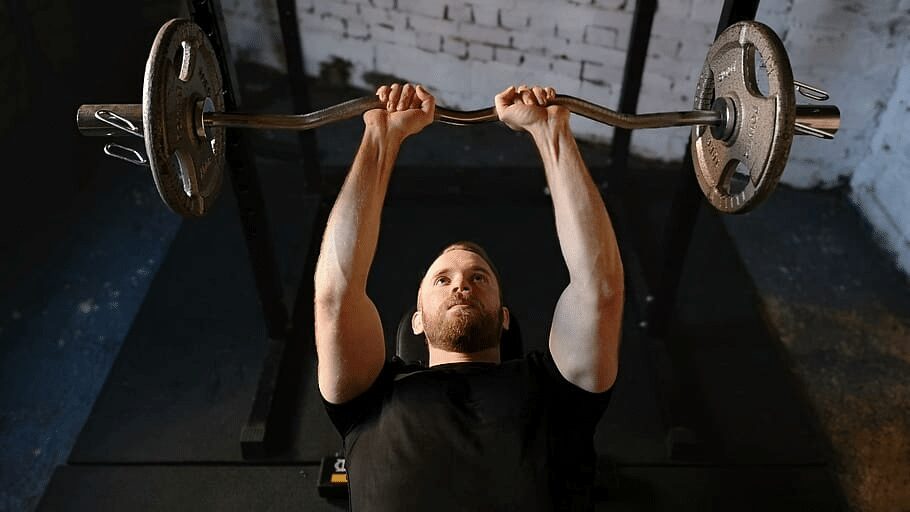
The EZ curl bar is a staple in my arm day workouts, specifically designed for smashing biceps and triceps. Its angled grips are super nice, aligning my wrists, forearms, and elbows in a way that feels natural while cutting down on joint stress. Honestly, it’s in its element when you’re curling or doing extensions, not so much when pressing.
While some folks might press with it, that’s not where this bar shines. Its purpose—keeping arm workouts effective and comfortable—doesn’t really translate to the bench. For those curious about the specifics, the benefits of using an EZ curl bar for its intended purpose are well worth a read, shedding light on why it’s such a great tool for arm training.
Comparing the EZ curl bar to a standard barbell highlights even more why it’s my go-to for arm isolation exercises. The difference in grip alone makes a significant impact on how the muscles are engaged and the overall strain on the joints. If you’re just getting into the world of curl bars, picking the best one for your needs can make all the difference in your training.
PROS
CONS
Best EZ Curl Bar – Rogue Curl Bar
The
The grip on this thing is solid. It’s got that
It’s also got a durable E-coat finish that can take a beating without showing it, and the rackable version is definitely better if you have to use it for bench variations. Plus, the sleeve length means you’ll never worry about running out of room for plates.
But, perfection is hard to come by. The price tag is steep, which might make some think twice. The grooved sleeves, while secure, do make more noise than I’d like, and the E-coat, though durable, feels a bit slicker than I’m used to. Also, while the shaft thickness works, I’ve heard some folks wish it were a bit heftier for a more comfortable grip.
All in all, the
Bamboo/Earthquake Bar
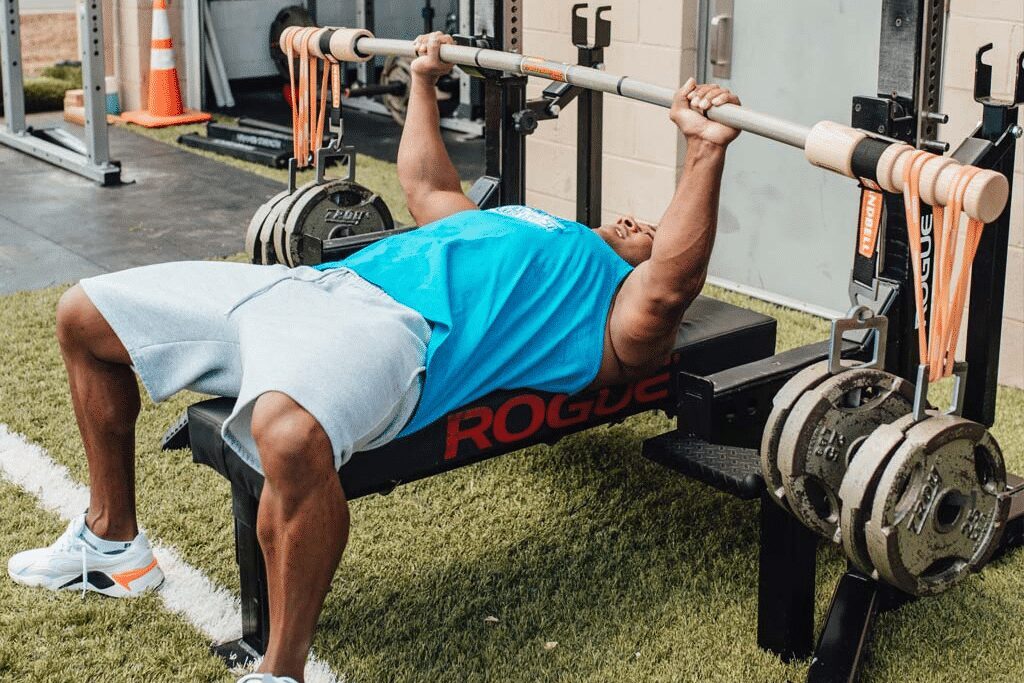
The Bamboo or Earthquake Bar is something of a hidden gem for anyone looking to amp up their stability in the bench or other movements. It’s not just another barbell; it’s a dynamic tool that introduces a level of instability you won’t find with your standard bar. This isn’t about making things harder just for the sake of it; this instability is a direct route to engaging and strengthening those smaller stabilizer muscles that are crucial for improving your overall lifting form and stability.
When you’re pressing with this bar, it’s not just your primary muscle groups doing the work; you’re calling on a whole network of muscles to keep the bar balanced. This is invaluable for athletes, CrossFitters, or anyone in rehabilitation looking to build strength in a comprehensive, functional way. It’s about training smarter, ensuring that your body is as resilient and versatile as your training demands.
However, it’s not all smooth sailing. The unique challenge it presents means there’s a bit of a learning curve, especially if you’re used to the predictability of straight bars. It’s also not the go-to for maxing out your lifts, given its focus on stability over sheer weight capacity. And while it’s a powerful tool for enhancing your training, finding one at your local gym might not be easy, and they can be a bit of an investment.
The Bamboo or Earthquake Bar could be awesome for your training, especially if you’re looking to shore up your stability, work around injuries, or just build strength in a more holistic manner. It’s about training not just for strength but for control, endurance, and injury prevention.
PROS
CONS
Best Bamboo/Earthquake Bar – BandBell Bamboo Bar
The BandBell Bamboo Bar emerges as the best choice for anyone looking to diversify their bench press training. Its unique capacity to introduce instability into your lifts is not just a gimmick; it seriously ramps up the challenge, demanding more from your stabilizing muscles than a conventional Olympic barbell ever would. This isn’t just about making your workout harder; it’s about making it smarter, targeting muscle engagement in a way that promotes strength gains without putting undue stress on your joints.
Many have pointed out how the Bamboo Bar excels in fostering strength improvements while sidestepping the joint inflammation often associated with heavy traditional lifting. This feature alone makes it a valuable tool for those aiming to increase their lifting capacity safely.
Its versatility is another major plus. Unlike some specialized bars that are good for just one or two exercises, the BandBell Bamboo Bar fits seamlessly into a wide array of workouts, from curls to presses, adding depth to your training program.
However, it’s worth noting that quality and innovation come at a price. The BandBell Bamboo Bar, while a solid investment for some, might be a bit steep for some budgets.
But, for those exploring options to build a stronger bench press that’s easy on the joints and provides more value to their overall training, the BandBell Bamboo Bar presents itself as an excellent pick.
What To Look For In Bench Press Bars
Picking the right bar to bench with is about more than what it looks like. The little things, like the knurling and how tough the bar is really do make a big difference. To get the lowdown on what to look for in a barbell and nail the perfect pick for your training, checking out a solid barbell buying guide can clear things up. For a simple overview of what to look for in a bench press bar, focus on the following points.
Knurling
When it comes to knurling on a bench bar, you want it just right—moderate to aggressive. This ensures the bar stays put in your hands, especially when you’re pushing up those heavier weights. No one wants the bar slipping when the bar is over your face.
Finish/Coating
The finish or coating on a barbell matters more than you might think. You’ve got options like stainless steel or cerakote, which not only look sleek but also keep maintenance low. Then there’s bare steel, which has that classic feel but will force you to clean it unless you want it to rust.
For a closer look at what each coating brings to the table, check out my guide on barbell coatings.
Shaft Diameter
When picking a bar for the bench, shaft diameter is key. Aim for at least 28.5mm, the standard for men’s multipurpose bars. Go thinner, like a 28mm men’s weightlifting or a 25mm women’s bar, and you’ll get more whip—not what you want when benching. Plus, those thinner bars can be tough on your palms, making your grip less comfortable. Stick to the thicker side for a solid, whip-free lift.
Spin
When it comes to the spin on a barbell, finding the right balance is key, especially for bench pressing. You want a bar that has a smooth spin to handle the movement of the plates without going overboard. Weightlifting bars spin fast, great for their purpose but not so much for benching as they can be unstable.
My go-to? Bushing bars.
They offer the right amount of spin without the instability. Hybrid bars with bushing and bearings come in second, giving you a bit more versatility. Straight-up bearing bars, though, might just spin too much for the bench, making things feel a bit out of control.
For a deeper dive into barbell mechanics and why that spin matters, this article on why Olympic barbells spin lays out everything you need to know.
Tensile Strength
Tensile strength on a barbell isn’t just a fancy term—it’s crucial, especially when you’re benching. Aim for a bar with at least 190,000 PSI. This isn’t just about handling the weight; it’s about confidence that your bar won’t let you down mid-lift.
For the scoop on exactly how much weight your barbell can comfortably handle, diving into this explanation on barbell weight capacities can clear up any questions.
Whip
Just like I mentioned with the shaft diameter earlier, choosing a barbell with a thicker shaft is the way to go if you’re looking to minimize whip while benching. Which you definitely want believe me! A stiffer barbell keeps your lifts smooth and controlled, without the unwanted bounce that can throw off your execution.
Versatility
I’m all about gear that can multitask. Multipurpose bars are my go-to because they handle everything from bench presses to squats without a hitch.
Power bars and Swiss bars? They’re solid for heavy-duty workouts, too. But here’s my take: unless you’ve got a specific reason, dropping cash on specialized bars like cambered or bamboo/earthquake bars might not be necessary, especially if you’re still rounding out your basic home gym setup. Of course, if you’re lucky enough to hit a gym stocked with every kind of bar imaginable, then picking and choosing becomes less about needs and more about preferences.
Value
Shelling out for those high-end bars with all the bells and whistles like stainless steel and lifetime warranties? Sure, they’re nice and cut down on maintenance, but are they essential?
Not really.
Most mid-range bars, priced between $200-$350, are more than enough for the majority of us, hitting that sweet spot of quality and value. If you’re curious about the perks of going premium, especially with stainless steel, this rundown on stainless steel barbells is worth a look. But unless you’re completely against a bit of upkeep, there’s no need to break the bank. Of course, if you’ve got the budget and want the best, by all means, go for it.
Conclusion
Picking the right bench press bar isn’t just about specs like knurling, finish, and diameter. It’s also about choosing between the types—be it a versatile all-rounder, a sturdy power bar, or a specialty bar like the Swiss or Bamboo for specific training needs. Each brings something unique to the table, from stability and grip to reducing joint strain.
Curious about how these differences play out in your training, or have a question on navigating the options? Drop a comment below and I’ll help you out!
Until next time,
-Dante
